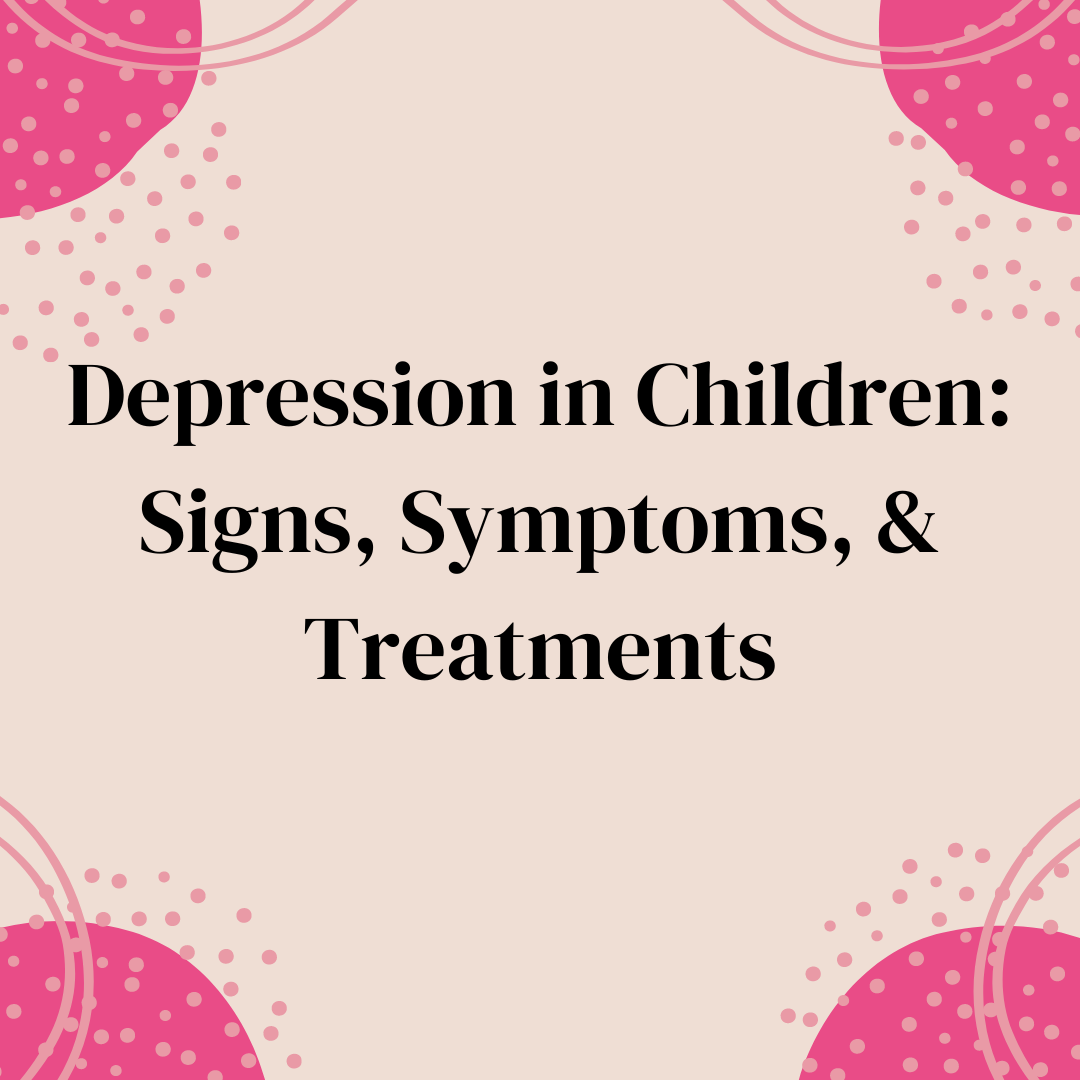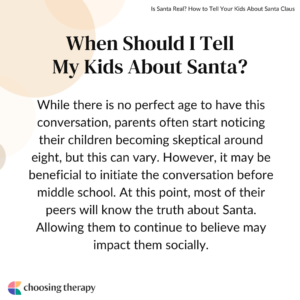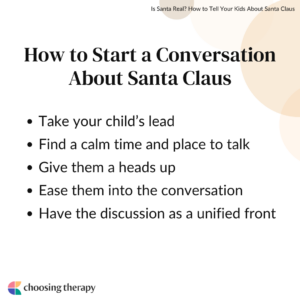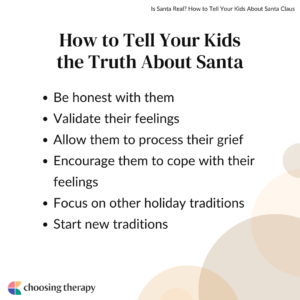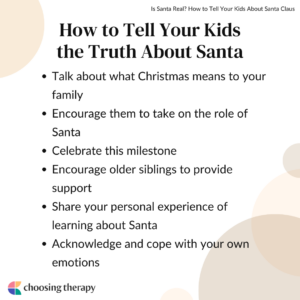Talking to your children about Santa Claus can be challenging. Children may be shocked, angry, and sad when they learn the truth about their presents under the Christmas tree. Parents can help children process and accept this news by being honest, validating their emotions, and exploring new holiday traditions.
Are you obsessively asking yourself “Am I a good parent?” Most parents occasionally ask themselves the question. However, if you are constantly worried about being a good parent and cannot control your fears, you might have OCD. Learn More
Is Santa Real?
In theory, the myth of Santa Claus is grounded in some facts because his origin is rooted in the historical figure Saint Nicholas of Myra, a 4th-century Christian bishop known for his generosity. However, Saint Nicholas has evolved over centuries as various cultures and traditions shaped his image into the modern Santa Claus. Highlighting the history of Santa and the values he embodies can create a greater understanding and appreciation for the spirit of giving during the holiday season.
When Should I Tell My Kids About Santa?
Many parents dread the day their child begins questioning if Santa is real. While there is no perfect age to have this conversation, parents often start noticing their children becoming skeptical around eight, but this can vary. However, it may be beneficial to initiate the conversation before middle school. At this point, most of their peers will know the truth about Santa. Allowing them to continue to believe may impact them socially.
How to Start a Conversation About Santa Claus
When telling your kids about Santa, begin the conversation gently and consider your child’s feelings and disposition. Consider starting the discussion by sharing your own childhood memories of Santa Claus and asking your children about their feelings toward Santa. Listen carefully to their query and encourage them to express their thoughts.
Below are tips for raising the conversation about Santa with your children:
- Take your child’s lead: Experts agree that letting your child take charge is usually best. Your child may show signs they are ready for this conversation when they start questioning Santa’s magic.
- Find a calm time and place to talk: Be sure to have this conversation when your child is relaxed. Avoid having the discussion in public or when your child is already upset. Remember that learning about Santa can be tough for children.
- Give them a heads up: Start by letting your child know you have something important to share about Santa Claus that may change their perspective about the admired figure. Doing so may ease them into the conversation.
- Ease them into the conversation: Rather than diving straight into the truth about Santa, ask your children about their current thoughts and feelings towards Santa. Play on the answers, using them to your advantage as you broach this discussion.
- Have the discussion as a unified front: Ensure that both parents are present when breaking the news. Your child needs to see their caregivers providing mutual support and answers to their questions.
Help For Parents Neuropsychological Testing For Children (including evaluations for Autism Spectrum Disorder, ADHD and Learning Disorders) Get answers in weeks, not months. Bend Health provides a complete report with in-depth findings, reviews with your schools, and a clinical diagnosis (if applicable). Learn more Online Therapy & Coaching (ages 1 -17) Bend Health is a virtual mental healthcare provider caring for kids, teens, and their families. Many insurance plans are accepted. Learn More Cooper – Expert Parenting Support Live, Weekly Parent Coaching – Immediate solutions to your most pressing challenges & Small Monthly Group Sessions with like-minded parents. Our experts have 10 years of experience in child development and are parents themselves! Sign up now to get 2 Months Free!
How to Tell Your Kids the Truth About Santa
How you approach telling your children about Santa should depend on their age, maturity level, and personality. If you anticipate your child being sensitive to this news, you should take extra caution. Remember that learning the truth about Santa is a big deal for young kids. They may experience strong emotional reactions.
Below are tips for telling your child about Santa Claus:
1. Be Honest
Explain that you noticed your child asking about Santa and want to be honest with them. You might also clarify why you withheld this information so they better understand your intentions. Sharing the origin story of Santa Claus can help ease tension during the conversation and maintain some of the magic your child may associate with Santa.
2. Validate Their Feelings
Your child will likely react with shock when you tell them the news about Santa. Empathize with their feelings by acknowledging their emotions. You might say, “I know this can be hard to hear. It is okay if you’re feeling upset right now.” Avoid statements like “Don’t cry” or “Don’t be sad.” These are dismissive and can make the situation worse.
3. Allow Them to Process Their Grief
Children may feel a sense of grief and loss when hearing about Santa. They may respond with sadness, anger, and bargaining. Children need space to talk about their feelings.
Helping your child process this grief can be uncomfortable, and you may feel tempted to encourage them to suppress their feelings. Listening, supporting, and offering empathy can go a long way in helping your children work through this experience.
4. Encourage Them to Cope With Their Feelings
It is important for children to process their feelings, but you also want to encourage them to cope with emotions. Engage your child in a discussion about positive and distracting activities, such as exercising, having a family game night, or spending time with a friend.
5. Focus on Holiday Traditions
Now that your child knows the truth about Santa, they may feel like the holidays have lost meaning. Remind them that Santa was only one aspect of the holidays, and there are many other traditions to enjoy, such as decorating the Christmas tree, seeing holiday lights, or going to church. Be sure to continue these even after Santa is no longer a part of your holiday traditions.
Parenting is stressful and challenging! Get support. BetterHelp has over 20,000 licensed therapists who provide convenient and affordable online therapy. BetterHelp starts at $65 per week. Take a Free Online Assessment and get matched with the right therapist for you.
6. Start New Traditions
After you have the ‘Santa Talk’ with your child, consider starting new holiday traditions with your family. You and your family could volunteer at a local soup kitchen, sing holiday carols with friends, or cook a special meal together. Starting a tradition can help your child adjust to a new type of Christmas and understand that the holidays can continue to be magical without Santa.
7. Talk About What Christmas Means to Your Family
As your child processes the truth about Santa, you can help by talking about the meaning of Christmas. For some families, the holiday may be about giving or practicing gratitude. Other families may have religious beliefs and values around Christmas. Whatever Christmas means to your family, emphasize this when talking to your children.
8. Encourage Them to Take on the Role of Santa
Adopting aspects of Santa may help your child cope with the news. You can encourage them to wrap gifts for others, just like Santa does. For example, they can earn money doing household chores and use it to purchase presents for family, friends, and other children in need. Allowing your child an opportunity “be Santa” can be a cathartic experience.
9. Celebrate This Milestone
Consider reframing this situation as a milestone that deserves celebration. You may treat your child to dinner, dessert, or a special present to mark the occasion. Explain that learning about Santa is a part of growing up and a sign of their maturity. Afterward, your child may view the experience as a gain rather than a loss.
10. Encourage Older Siblings to Provide Support
You can ask older siblings or other family members to offer support during this tough time. Talking about Santa with older kids and hearing how they learned the truth may help your child process this information. They may also feel like “one of the older kids” now, which can help foster their confidence.
11. Share Your Personal Experience of Learning About Santa
Children may benefit from hearing how you learned about Santa. Consider sharing your own experience and how you dealt with this news. Doing so provides an opportunity to bond and help your child feel less isolated.
12. Acknowledge & Cope With Your Own Emotions
You will most likely have your own reactions to your child learning the truth about Santa. You may also grieve the loss of Santa as you realize your child is growing up and the holidays are evolving. These feelings are all normal and a part of the parenting process. Remember to take care of yourself during this time and seek your own support.
Are you obsessively asking yourself “Am I a good parent?” Most parents occasionally ask themselves the question. However, if you are constantly worried about being a good parent and cannot control your fears, you might have OCD. Learn More
What to Expect After Telling Your Kids That Santa Isn’t Real
Children may have strong negative reactions to learning the truth about Santa. Often these reactions lessen over time as children process this information. While it can be hard to see your child suffering, remember that this is a normal developmental process.
The following are common reactions a child might have after learning Santa isn’t real:
- Shock: Children may initially feel shocked by the truth about Santa. Even kids wondering about Santa may be surprised to hear you confirm their suspicions. You can acknowledge that this reaction is normal and encourage them to share other feelings they may have.
- Confusion: After children work through their initial shock, they may respond with confusion. They may ask you questions about other characters like the tooth fairy or Easter bunny. It’s best to be completely honest with them at this point.
- Sadness: Children are usually sad to learn that Santa does not exist. Try to empathize with this feeling and encourage them to elaborate on why they feel this way.
- Anger: Some children may feel angry with you. They may interpret their belief in Santa as a lie. You might share how you wanted them to enjoy the spirit of Christmas and all of the joy that comes with it.
- Skepticism: It’s understandable for children to be skeptical of you shortly after your talk. They may wonder if you are holding back other information from them. Be honest, provide reassurance, and give it time to re-establish trust.
- Anxiety: If children respond with anxiety or excessive worry, try to understand what is causing them to feel anxious. Empathize with their feelings and provide reassurance.
When to Seek Professional Help
Talking about Santa can be incredibly difficult for you and your children. Some kids take the news well, while others may need more time. Therapy may provide the tools necessary to communicate this truth with your child and help them process their emotions. Depending on your child, seeking extra support may be helpful in navigating this developmental milestone.
If your child seems more sad or worried than usual, they may be dealing with depression, anxiety, or an adjustment disorder.1 In these cases, you may consult their pediatrician before contacting a therapist. Several types of therapy can be effective, including play therapy, parent-child interaction therapy (PCIT), and cognitive behavioral therapy for kids.2,3,4
Parent coaching can also help parents acquire skills for approaching topics like Santa.5 This method is directive, with the coach providing explicit information and guidance on how to talk to children effectively and respond to their reactions. When ready, you can find the right therapist specializing in parenting or family therapy in an online therapist directory.
Final Thoughts
Telling your kids the truth about Santa can be challenging. However, there are ways to help keep the Christmas spirit alive as your family adjusts to this new concept.
To help our readers take the next step in their mental health journey, Choosing Therapy has partnered with leaders in mental health and wellness. Choosing Therapy is compensated for marketing by the companies included below. Neurological Testing Neuropsychological Testing For Children (including evaluations for Autism Spectrum Disorder, ADHD and Learning Disorders). Get answers in weeks, not months. Bend Health provides a complete report with in-depth findings, reviews with your school, and a clinical diagnosis (if applicable). Learn More Online Therapy & Coaching (ages 1 -17) Bend Health – is a virtual mental healthcare provider caring for kids, teens, and their families. Many insurance plans are accepted. Learn More OCD and Children NOCD – What are the signs of OCD in children? OCD involves unwanted intrusive thoughts, images, or urges (obsessions) that create anxiety, which the child attempts to relieve by performing rituals (compulsions). These rituals can be overt and noticeable (e.g. handwashing, counting, avoiding objects, rearranging materials, etc.) or can be less noticeable or mental (e.g. silently analyzing, reiterating phrases, counting, etc.). To find out if your child has OCD and treatment options, schedule a free 15 minute call with NOCD. Online Therapy (For Parents) BetterHelp – Get support and guidance from a licensed therapist. BetterHelp has over 20,000 therapists who provide convenient and affordable online therapy. Complete a brief questionnaire and get matched with the right therapist for you. Get Started Parenting Support Cooper – Live, Weekly Parent Coaching – Immediate solutions to your most pressing challenges & Small Monthly Group Sessions with like-minded parents. Our experts have 10 years of experience in child development and are parents themselves! Sign up now to get 2 Months Free!Additional Resources
How to Find & Choose the Right Therapist for Your Child Discovering and selecting the right therapist for your child often comes down to two things: research and persistence. Be willing to put in the time and effort to call around to different therapists or therapy organizations in your area. Read through therapist profiles to see if their style, approach, and expertise resonate with you and your child.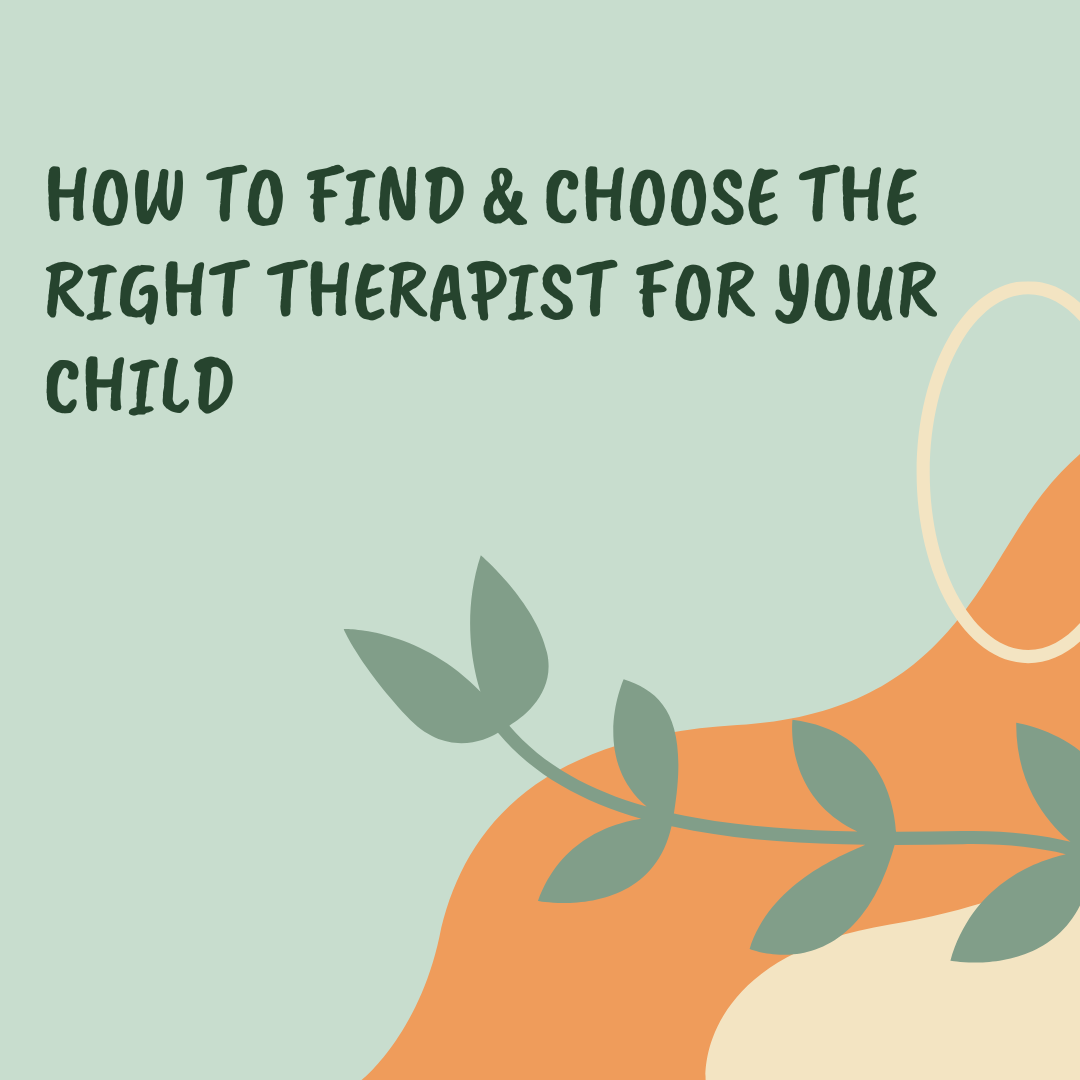
Depression in Children: Signs, Symptoms, & Treatments If you or someone you know is concerned about symptoms related to depression, seeking professional help from a mental health provider is highly recommended. Licensed professional counselors, social workers, psychologists, or psychiatric medication prescribers are able to determine whether a person is experiencing depression and the best methods of treatment.